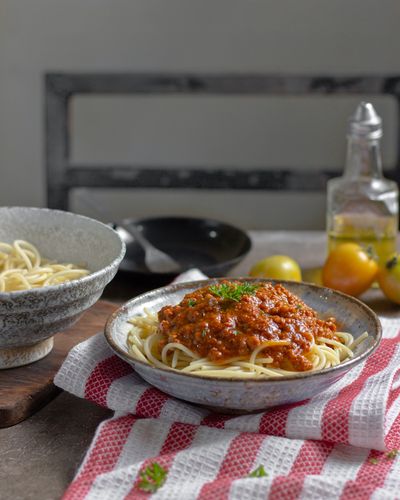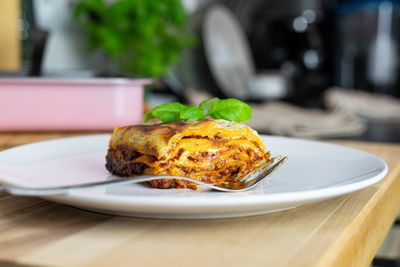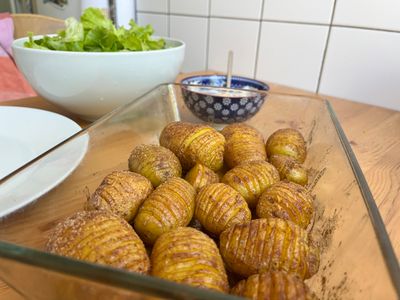Reference Recipe: Wiener Schnitzel with Potato Salad
Recipe for schnitzel with potato salad
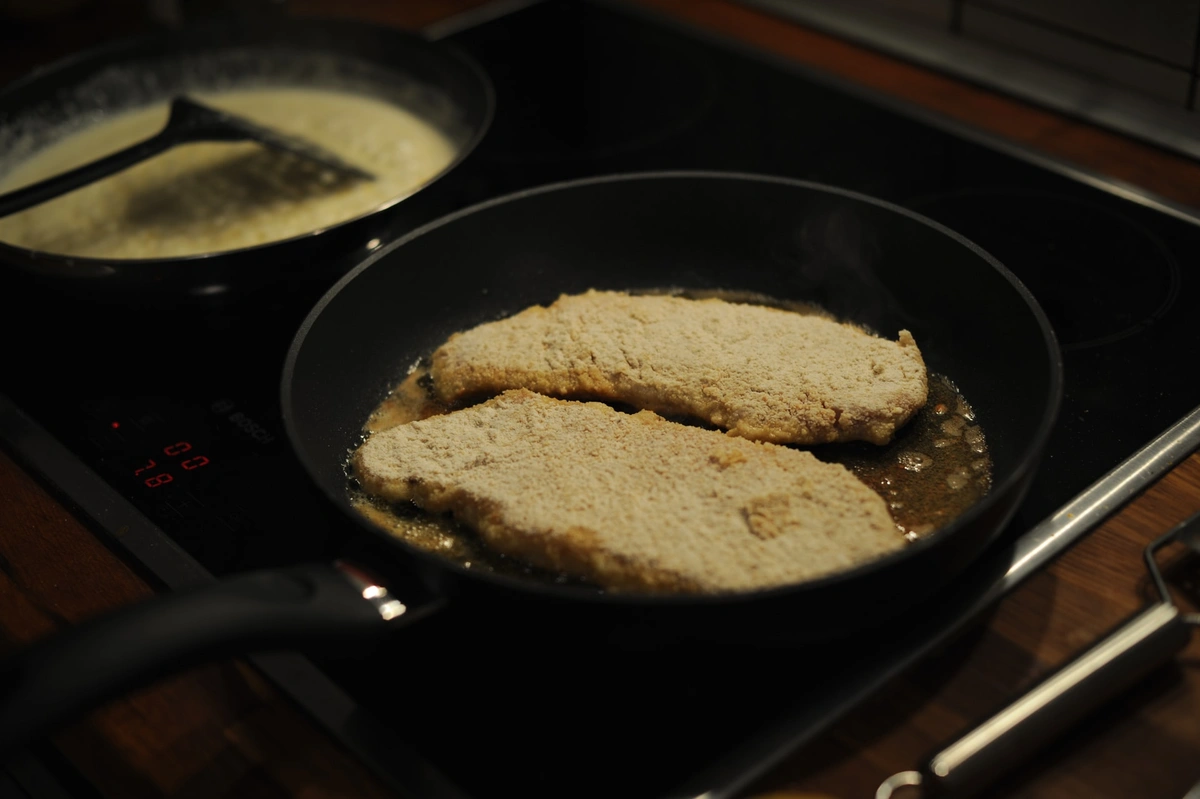
Recipe Categories:
To give you a better idea of how climate-friendly different recipes are, I have used some reference recipes for comparison. These classic recipes are not necessarily the most climate-friendly, but serve as a benchmark for all other recipes. The following article is one of these reference recipes
No question about it: Schnitzel with potato salad is an absolute classic that is prepared in millions of kitchens. So the recipe should come as no great surprise. However, looking at the CO2 emissions was quite exciting for me: although I knew that veal has a relatively high carbon footprint, I was surprised at how high it is in relation to the rest of the recipe. You can find an overview of the estimated carbon footprint directly after the recipe.
Recipe
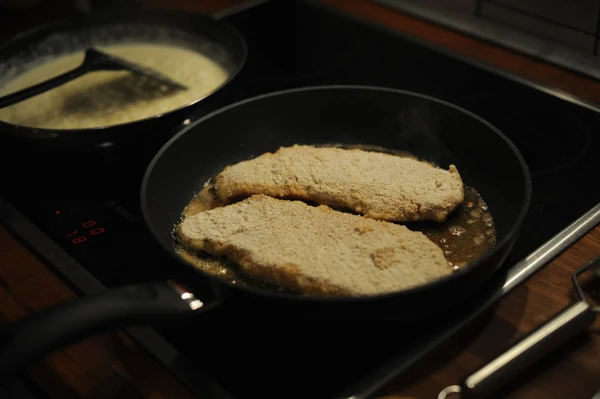
Schnitzel in the pan
Ingredients
Preparation Time: 20 min
Total Time: 40 min
Servings: 2
- • 400 g potatoes
- • 1 small onion
- • 75 ml vegetable stock
- • 2.5 tablespoons oil
- • 20 ml vinegar, e.g. white wine vinegar
- • 1 tablespoon mustard
- • 1 pinch of pepper
- • 1 pinch of sugar
- • 2 veal escalopes (approx. 150-175 g each)
- • 1 pinch of salt
- • 1 pinch of pepper
- • 15 g flour
- • 1 egg
- • 30 g breadcrumbs
- • 50 ml neutral oil, e.g. sunflower seed or rapeseed oil
Ingredients
Servings: 2
Preparation Time: 20 min
Total Time: 40 min
- • 400 g potatoes
- • 1 small onion
- • 75 ml vegetable stock
- • 2.5 tablespoons oil
- • 20 ml vinegar, e.g. white wine vinegar
- • 1 tablespoon mustard
- • 1 pinch of pepper
- • 1 pinch of sugar
- • 2 veal escalopes (approx. 150-175 g each)
- • 1 pinch of salt
- • 1 pinch of pepper
- • 15 g flour
Instructions
- 1 First make the potato salad. Roughly clean the potatoes and boil them in salted water for 20-30 minutes.
- 2 While the potatoes are cooking, chop the onion into small cubes. Bring the onion cubes to the boil in the vegetable stock.
- 3 Remove the stock from the heat. Add the vinegar, oil, mustard, pepper, and sugar to the stock and onions. Cover the pan and simmer until the potatoes are cooked.
- 4 (In the meantime, you can prepare the schnitzel.) When the potatoes are cooked, drain the cooking water, peel the potatoes, and slice them.
- 5 Place the potato slices in a bowl and pour the stock over them. Use a spoon to make sure that all the potato slices are covered with the stock. You will have a little too much liquid at first, but the stock will slowly soak in. After a few minutes, you can moisten the potatoes again and the rest of the stock will be absorbed. Set the potato salad aside until ready to serve; ideally, it should still be lukewarm.
- 6 Flatten the schnitzel slightly. (If you don't have a meat tenderizer, you can place the schnitzel in a plastic bag and hit the bag with a pan or saucepan to flatten the schnitzel).
- 7 Salt and pepper both sides of the schnitzel. Prepare three deep plates for the breadcrumbs: put the flour in the first plate, the beaten egg in the second, and the breadcrumbs in the third.
- 8 Dip each schnitzel in the flour, then in the egg with a fork, and finally in the breadcrumbs on both sides.
- 9 Heat the oil in a frying pan. Fry the schnitzel for 3 to 5 minutes on each side until they are golden brown. Serve with the potato salad.
Carbon Footprint
Carbon Footprint: 4943 g CO₂e
This ranks it number 58 out of 58 recipes published on the blog so far in terms of estimated carbon footprint.
In other words, it is one of the five recipes with the worst carbon footprint. 😱
The comparison between the potatoes and the veal schnitzel is particularly interesting: the potatoes account for almost 40% of the total weight of the ingredients, but only 2% of the estimated carbon footprint (or 3% if cooking is included). The veal, on the other hand, accounts for more than 80% of the dish's CO2 emissions, although it only represents less than 30% of the weight of the ingredients.
Comparison of Ingredients
| Ingredients | Carbon footprint per kg | Carbon footprint for recipe | % of ingredients | % of CO₂ emissions |
|---|---|---|---|---|
| potatoes | 0.2 | 80 | 38% | 2% |
| onion | 0.2 | 17 | 8% | 0% |
| vegetable broth | 0.2 | 17 | 7% | 0% |
| oil | 3.2 | 80 | 2% | 2% |
| vinegar | 0.2 | 4 | 2% | 0% |
| mustard | 0.2 | 2 | 1% | 0% |
| pepper | 1.1 | 1 | 0% | 0% |
| sugar | 0.9 | 1 | 0% | 0% |
| veal schnitzel | 13.6 | 4085 | 28% | 83% |
| salt | 1.1 | 1 | 0% | 0% |
| pepper | 1.1 | 1 | 0% | 0% |
| flour | 0.9 | 13 | 1% | 0% |
| egg | 3.0 | 150 | 5% | 3% |
| breadcrumbs | 0.6 | 18 | 3% | 0% |
| oil | 3.2 | 160 | 5% | 3% |
| Boil potatoes | 91 | 2% | ||
| Boil broth | 20 | 0% | ||
| Pan-fry: schnitzel | 203 | 4% |
Instructions
- 1 First make the potato salad. Roughly clean the potatoes and boil them in salted water for 20-30 minutes.
- 2 While the potatoes are cooking, chop the onion into small cubes. Bring the onion cubes to the boil in the vegetable stock.
- 3 Remove the stock from the heat. Add the vinegar, oil, mustard, pepper, and sugar to the stock and onions. Cover the pan and simmer until the potatoes are cooked.
- 4 (In the meantime, you can prepare the schnitzel.) When the potatoes are cooked, drain the cooking water, peel the potatoes, and slice them.
- 5 Place the potato slices in a bowl and pour the stock over them. Use a spoon to make sure that all the potato slices are covered with the stock. You will have a little too much liquid at first, but the stock will slowly soak in. After a few minutes, you can moisten the potatoes again and the rest of the stock will be absorbed. Set the potato salad aside until ready to serve; ideally, it should still be lukewarm.
- 6 Flatten the schnitzel slightly. (If you don't have a meat tenderizer, you can place the schnitzel in a plastic bag and hit the bag with a pan or saucepan to flatten the schnitzel).
- 7 Salt and pepper both sides of the schnitzel. Prepare three deep plates for the breadcrumbs: put the flour in the first plate, the beaten egg in the second, and the breadcrumbs in the third.
- 8 Dip each schnitzel in the flour, then in the egg with a fork, and finally in the breadcrumbs on both sides.
- 9 Heat the oil in a frying pan. Fry the schnitzel for 3 to 5 minutes on each side until they are golden brown. Serve with the potato salad.
Carbon Footprint
Carbon Footprint (2 portions): 4943 g CO₂e
This ranks it number 58 out of 58 recipes published on the blog so far in terms of estimated carbon footprint.
In other words, it is one of the five recipes with the worst carbon footprint. 😱
The comparison between the potatoes and the veal schnitzel is particularly interesting: the potatoes account for almost 40% of the total weight of the ingredients, but only 2% of the estimated carbon footprint (or 3% if cooking is included). The veal, on the other hand, accounts for more than 80% of the dish's CO2 emissions, although it only represents less than 30% of the weight of the ingredients.
Comparison of Ingredients
| Ingredients | Carbon footprint per kg | Carbon footprint for recipe | % of ingredients | % of CO₂ emissions |
|---|---|---|---|---|
| potatoes | 0.2 | 80 | 38% | 2% |
| onion | 0.2 | 17 | 8% | 0% |
| vegetable broth | 0.2 | 17 | 7% | 0% |
| oil | 3.2 | 80 | 2% | 2% |
| vinegar | 0.2 | 4 | 2% | 0% |
| mustard | 0.2 | 2 | 1% | 0% |
| pepper | 1.1 | 1 | 0% | 0% |
| sugar | 0.9 | 1 | 0% | 0% |
| veal schnitzel | 13.6 | 4085 | 28% | 83% |
| salt | 1.1 | 1 | 0% | 0% |
| pepper | 1.1 | 1 | 0% | 0% |
| flour | 0.9 | 13 | 1% | 0% |
| egg | 3.0 | 150 | 5% | 3% |
| breadcrumbs | 0.6 | 18 | 3% | 0% |
| oil | 3.2 | 160 | 5% | 3% |
| Boil potatoes | 91 | 2% | ||
| Boil broth | 20 | 0% | ||
| Pan-fry: schnitzel | 203 | 4% |
